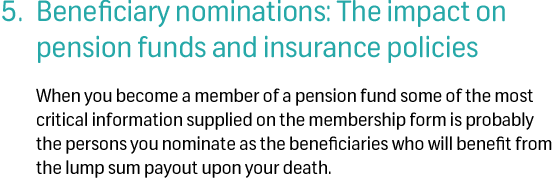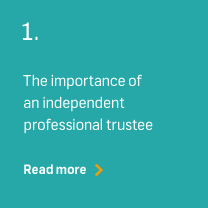|

|
| |
 |
| |
Welcome to the latest edition of our Fiduciary newsletter through which we aim to update you on matters relating to estate planning, Wills and trusts.
With the start of the new year it’s time for us to reassess our personal situations and whether our financial and estate plans are still valid and up to date.
It’s an unfortunate fact that many people do not take time to do even the most basic form of estate planning and according to the Master of the High Court as many as 70% of all estates reported, are for people dying without a valid Will.
In this issue we offer some great planning guidelines to assist with the review and design of your Will, trust and estate plan. |
|
| |
| |
| In this newsletter: |
| |
|
|
 |
|
|
|
| |
| Competition |
| |
You could win eB20 000. Simply let us know if your Will is still up to date. Email your confirmation, full names and date of birth to trustservices@fnb.co.za.
Terms and Conditions
1. Judges decision is final. 2. The competition is open to all customers with an existing Will. 3. Competition excludes FirstRand staff. 4. Proof of identity will be required to claim your prize. 5. Competition closes 28 February 2015. 6. Draw will take place on 10 March 2015. 7. The winner will be notified via telephone upon which arrangements for taking delivery of the prize will be made. 8. The winner must hold or open an eBucks account as eBucks will only be paid into a valid eBucks account. |
|
|
|
| |
How can we help you?
Keep in touch
Simply e-mail us on trustservices@fnb.co.za or call us on 087 736 3555 for any Will, trust or estate planning and administration query or any suggestions or feedback on our newsletter. |
|
| |
| |
| |
|
 |
| |
In the recent few years trusts have received increased attention from our courts and in some instances came under severe scrutiny due to the misuse and abuse thereof. Trusts offer a myriad of benefits provided that the trust has been appropriately constituted and is correctly managed - the latter resting squarely on the shoulders of the appointed trustees. It has become increasingly important to ensure that the trustees of the trust understand their duties and responsibilities when acting as a trustee of a trust.
In the landmark case of Land and Agricultural Bank of SA vs Parker and others, the role of an independent trustee as well as the importance of the separation of enjoyment and control of trust asset, were stressed by the court. The lack of separation of the enjoyment and the control of the trust assets are commonly known as the alter ego effect. |
In terms of this principle any trustee controlling trust assets as if it were his own, would be deemed to be the owner of the said assets and thereby forfeiting the benefits and protection that the trust vehicle offers.
It is essential to appoint an independent trustee who understands the fiduciary responsibilities of an independent trustee.
An independent trustee is considered to be a person or corporate that is not related or connected to the trustees, beneficiaries or donors to the trust. An independent trustee must show objectivity in the management of trust assets and provide ‘arms length’ transacting capacity between the trustees and beneficiaries. |
|
| |
| |
|
| |
| The duties of the trustees include, but are not limited to: |
| |
Administering the trust property in accordance with the provisions of the trust deed.
- Ensuring that the Letters of Authority appointing the trustees held at the offices of the
Master of the High Court are current.
- Facilitating the formal meeting of the trustees.
- Holding all trust documents in a safe and secure place.
- Preparing the agenda and take minutes at trustee meetings.
- Compiling the trust resolutions in respect of matters resolved at meetings.
- Reviewing the trust investment portfolio report with the investment manager.
- Being available to the beneficiaries for consultations regarding matters of a financial or
related nature.
- Advising on the optimal tax strategy for the trust and beneficiaries.
- Advising the trustees on matters of policy and direction for the trust.
- Ensuring that accountants are appointed and review the trust accounts and annual financial
statements.
- Ensuring that the trust tax compliance function is attended to by appropriate persons.
- Ensuring that the trust has a bank account and that all transactions are appropriately authorised.
- Reviewing the bank statements of this account on a regular basis.
|
|
| |
Back to Top  |
|
 |
| |
Certain matters are often overlooked when making decisions regarding the content of a Will.
This could result in unintended consequences which could delay the finalisation of the estate administration process and even lead to unexpected burdens being placed on the family.
Some of the common issues overlooked include:
Wills not being reviewed
Your Will should be reviewed on a regular basis and be amended as your circumstances change, i.e. when you get married, the birth of a child, dissolution of your marriage.
Not understanding the effect of your marital regime
When you are married in community of property, each spouse owns an undivided half share in all the assets in the joint estate. This means that when you bequeath 50% of your estate to your spouse, such bequest will result in your surviving spouse effectively only inheriting 50% of the one half of the joint estate. For example, if the couple owned a fixed property, the surviving spouse will ultimately own 75% of the fixed property and not the full 100% as was intended by the testator.
Restriction relating to the bequest of agricultural land
The Subdivision of Agricultural Land Act prevents the subdivision of agricultural land. This means that agricultural land cannot belong to more than one owner at a time. Should you for instance wish to bequeath your farm to your three sons, you will have to consider setting up a trust or company to own the farm and in turn have your three sons as beneficiaries/shareholders of the entity. It is crucial that the testator is fully aware of the effect of the restriction in terms of the abovementioned Act, in order to ensure that the provision of the Will does not leave the heirs of the estate with a list of complications.
Inadequate provision for protection of the interests of minor beneficiaries
If the intention is to benefit an heir who is under the age of 18 years, and no testamentary trust is created in the Will for such a minor beneficiary, the inheritance in question will be paid to the Guardian’s Fund until the heir attains majority age. In terms of the Children’s Act 38 of 2005 this is at the age of 18 years. In relation to minor children, it is also important to nominate a guardian of your choice in your Will.
Inadequate or no provision for a surviving spouse
If the surviving spouse of a deceased person was financially dependent, or partially financially dependent on the deceased and the deceased failed to make provision for the surviving spouse in his Will, such surviving spouse has the right to claim maintenance from his estate in terms of The Maintenance of Surviving Spouses Act. |
| |
|
| |
| |
| The contents of your Will should be carefully considered when drafted. Equally important is the fact that your Will should be reviewed at least once a year and amendments made thereto in order to provide for any changes in your circumstances. |
| |
| |
|
Back to Top  |
| |
| |
|
|
| |
Effective planning for the continuity of the business is unfortunately something that many business owners procrastinate over. More often than not, this lack of planning leads to the demise of the business after the death of the business owner, impacting the lives of all employees and their families.
Business owners have an added responsibility: not only do they have to consider the needs of their immediate beneficiaries but proper planning to ensure the future well-being of the business, is also required. It is essential that consideration is given to the following as part of the estate plan of all business owners:
- Identify someone with the necessary skills that could take over the management of the busi
ness immediately after the death of the business owner or during the administration process.
- Consider entering into an agreement with business partners regarding the future
ownership of business interests. This should be supported by some form of financing
arrangement which will provide sufficient capital in order to fund the purchase of the interests
of the deceased partner from his estate.
- The appointed executor will have to be able to settle all liabilities including any outstanding
balances owed by the business owner to the business as part of outstanding credit loan
accounts.
- Any amount owed to the deceased business owner by the business as part of a loan
agreement will form part of the deceased’s estate and will be claimed and recovered by the
executor in favor of the estate. This may have a negative impact on the business in the event
that there aren’t sufficient funds in the business to settle the aforementioned loans.
- The Close Corporation Act provides that if the testator bequeaths his interest in the close
corporation to a non-member in his Will, the remaining members have to consent thereto. The
effect of this is that the executor will have to request such consent and the members will have
28 days within which to reply. Failing such consent, the executor will have to sell the deceased’s
member’s interest to:
— the close corporation itself;
— the other members in the close corporation;
— any other person who qualifies for such membership.
- Another matter that is also easy overlooked is the issue of personal surety. Often business
owners will personally sign surety for business debts. It is important to keep in mind that there
may be additional claims against the estate as a result of business loan agreements that were
entered into as well as credit facilities for which the business owner personally signed surety.
The above list is non-exhaustive and only highlights some of the factors that need to be considered when compiling a comprehensive estate plan. Each business is different and most will likely have additional unique requirements that need to be catered for. |
| |
|
Back to Top  |
| |
|
 |
| |
| |
This is usually the case with the elderly and often family members just assume that a general power of attorney is the solution and covers all eventualities. A common misconception is that one can appoint a person through a power of attorney just in case “something should happen”. Usually it is with some form of mental incapacity in mind.
There are broadly speaking two variations of a power of attorney. The first type allows you to appoint a person for very specific functions only and this appointment in the narrow sense is done via a “limited power of attorney” (sometimes also referred to as a “special power of attorney”). The more common use is the “general power of attorney” (also referred to as “full power of attorney”).
A limited power of attorney will normally be specified as to its limitations whereas a full power of attorney allows your appointed agent to borrow funds in your name (although most banks generally only recognize their own limited power of attorney forms), buy and sell property in your name and enter into contracts on your behalf.
This power should not be given lightly and although it may be withdrawn verbally, it is normally done by |
the return of the original document of appointment. Most parties will not transact with your agent unless he can produce this original document.
Very important though is to understand that a power of attorney is only valid for reasons of physical absence and that it becomes invalid when the person granting the power of attorney becomes incapacitated due to any type of mental disorder and is unable to withdraw the appointment or is unable to understand the nature of the transaction.
Should a person no longer be able to make lucid decisions due to mental incapacity then a family member or close friend could start legal proceedings to have this person declared unfit to look after their own affairs.
If the court finds in favour of the application then it will appoint a curator bonis to look after the financial affairs of the person concerned. It will involve court action and the legal representative of the applicant will in most cases be appointed as a curator ad litem (curator in the meantime) until a curator bonis can be appointed. The application for and the appointment of a curator is unfortunately a lengthy and costly process. |
|
| |
|
| |
| |
| Individuals considering appointing someone else to handle their affairs, or anyone considering accepting such an appointment, should carefully regard the purpose of this appointment and, where necessary, seek adequate advice. |
| |
| |
|
Back to Top  |
| |
| |
|
 |
| |
It is often assumed that once we have nominated beneficiaries on our pension fund nomination form our part has been done and that our beneficiaries will get the benefit we intended for them to get, and in the ratios we specified. This is unfortunately not always the case. The distributions of death benefits of pension funds are subject to the regulations of Section 37C of the Pension Funds Act 24 of 1956.
The Act states that members of retirement funds do not enjoy freedom of testation over their retirement benefits due to the fact that retirement funds are not regarded as assets in the deceased member’s estate. The trustees of the pension fund are obliged to distribute benefits to the dependants of the deceased member. |
|
| |
| |
| |
| The Act defines a dependant as: |
| |
(a) a person in respect of whom the member is legally liable for maintenance;
(b) a person in respect of whom the member is not legally liable for maintenance, if such person was:
(i) in the opinion of the board, upon the death of the member in fact dependent on
the member for maintenance;
(ii) the spouse of a member;
(iii) the child of a member, including posthumous child, adopted child and a child born
out of wedlock.
(c) a person in respect of whom the member would have become legally liable for maintenance, had the
member not died. |
| |
|
| |
| |
|
The trustees of the pension fund must ensure that the dependants are left with adequate support. It often happens that a person who is not a dependant is nominated as a beneficiary on the pension fund nomination form, for example a nephew or niece. In such a case the trustees may still consider making distributions to such persons, but are not obliged to do so.
It is important to know that the financial welfare of dependants are the first priority of the trustees and even though you have neglected to nominate a dependant as a beneficiary, that person can still benefit from your pension fund.
Beneficiary nominations are also very relevant when life policies are considered. In most cases clients are advised to nominate the surviving spouse as the beneficiary of a life policy for the simple reason |
that there will be no estate duty and executor’s fees payable on life policies received directly by the surviving spouse. This often leaves the estate with a cash shortfall because there is insufficient liquidity in the estate to settle the liabilities and the expenses incurred in winding up the estate.
These expenses could include executor’s fees, transfer cost of the fixed property, income tax, valuation costs, master’s fees and advertising costs. It is always advisable to do an estate plan and liquidity analysis before deciding on beneficiaries of your life policies.
Even those aspects of your financial and estate plan that have been addressed by way of a beneficiary nomination may have an impact on other aspects of your estate plan. |
|
| |
| |
| |
| Individuals considering appointing someone else to handle their affairs, or anyone considering accepting such an appointment, should carefully regard the purpose of this appointment and, where necessary, seek adequate advice. |
| |
| |
|
Back to Top  |
| |
| |
| |
© Copyright 2015, First National Bank - a division of FirstRand Bank Limited.
An Authorised Financial Services and Credit
Provider (NCRCP20).
|
|
| |











